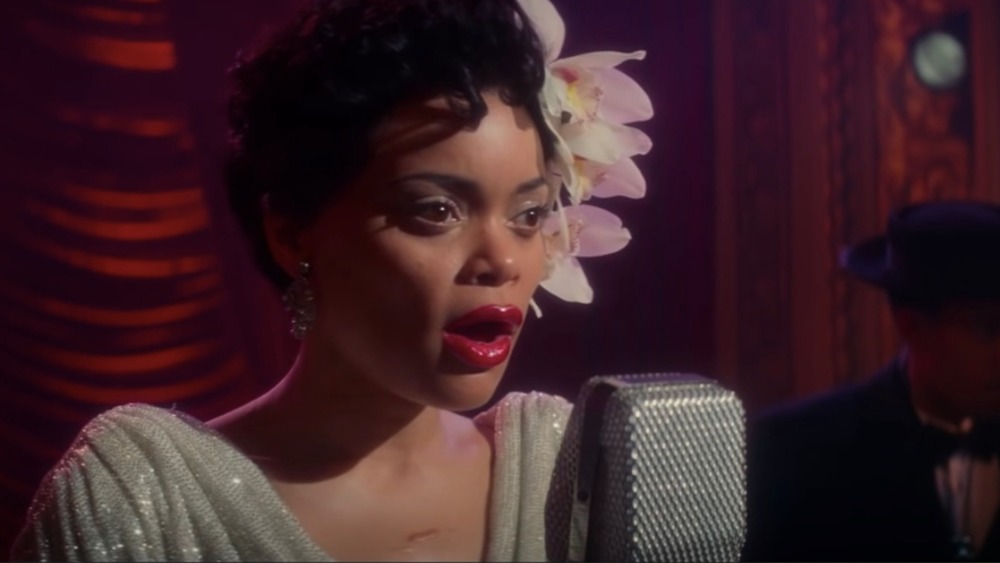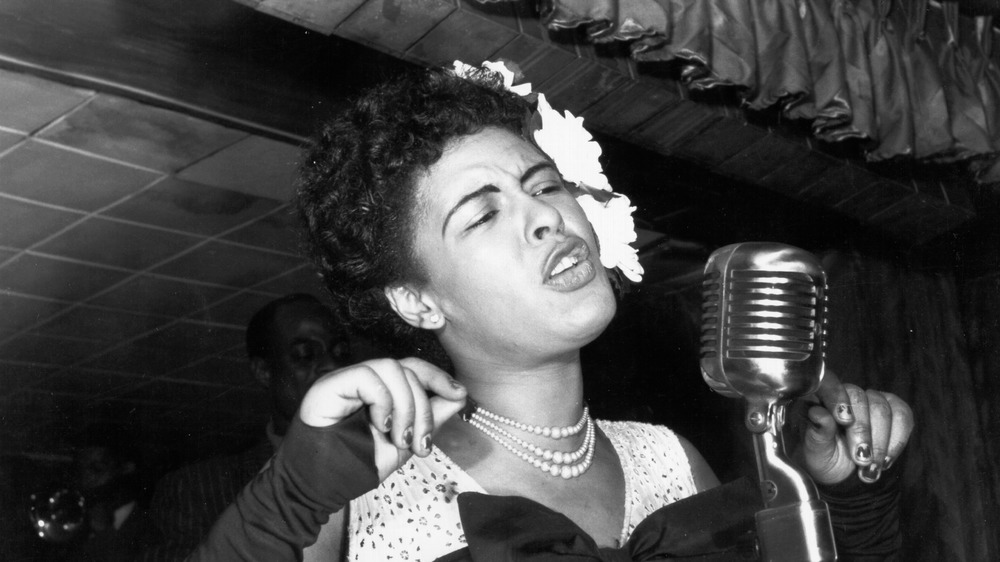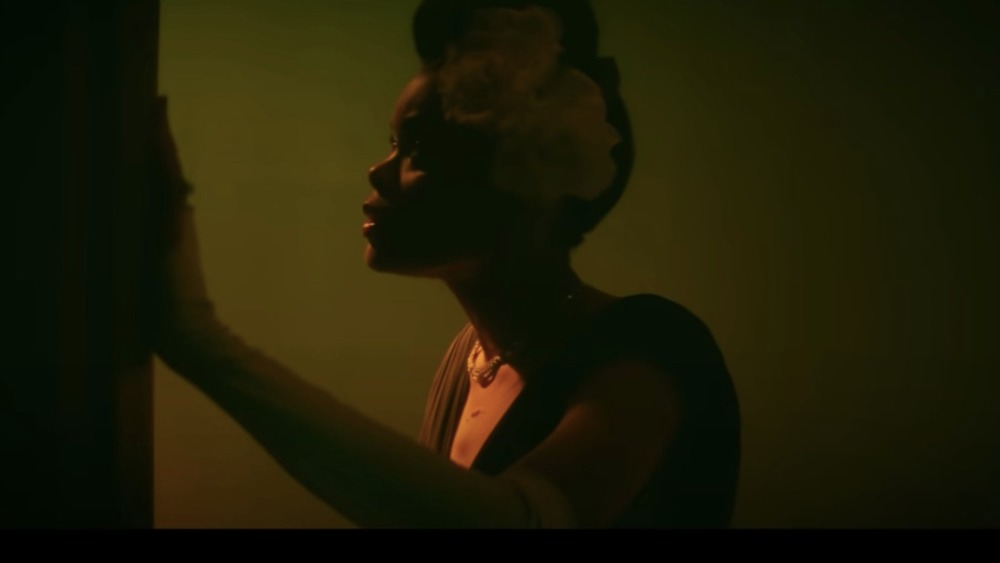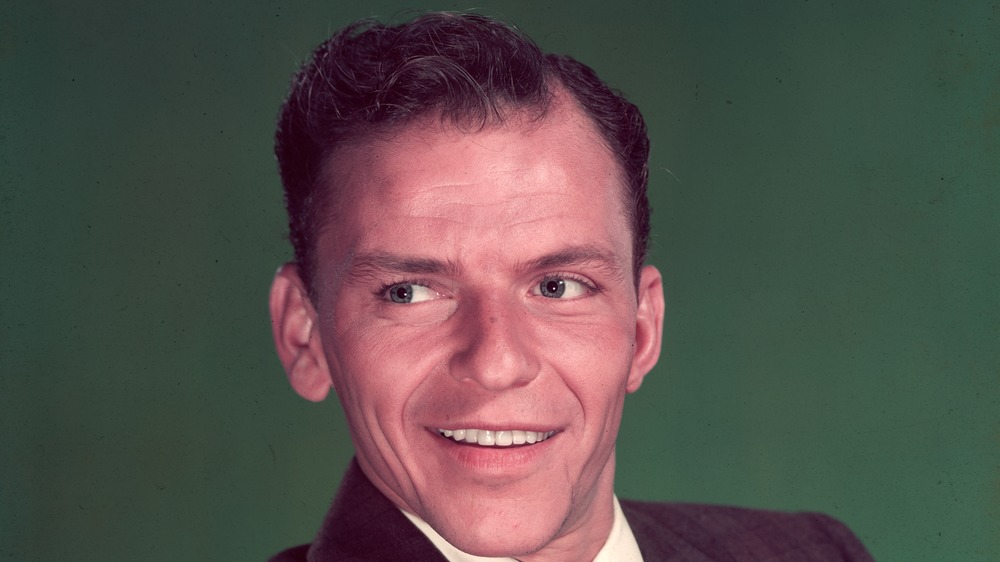Things The United States Vs. Billie Holiday Didn't Tell You
Making a movie about legendary jazz singer Billie Holiday is admittedly not an easy task. Holiday lived a hectic and complicated life, and even much of her own autobiography, the 1956 memoir Lady Sings the Blues, is considered historically dubious. Writing for The National Post in 2005, journalist Robert Fulford went so far as to say, "There will never be an authoritative Life of Billie Holiday. The documents don't exist, and the witnesses have often lied." He wrote that Billie's addictions to alcohol and heroin affected how she remembered events in her own life, that she "herself would tell the same story several ways."
So director Lee Daniels can be forgiven for what critics are calling misrepresentations, omissions, and outright falsehoods in his new film The United States vs. Billie Holiday, which premiered on Hulu on February 26. Up to a point, at least. Like any filmmaker focusing on the tumultuous life of a famous musician, Daniels focused heavily on certain aspects of the singer's life while ignoring others, dramatized and took liberties with certain events, and unfortunately fell into some tired traps of the musician biopic. Let's take a look at what The United States vs. Billie Holiday got right, what it got wrong, and what it didn't tell you about Lady Day's often tragic life.
Billie Holiday wasn't as politically active as the movie suggests
The film focuses on Holiday's 1939 song "Strange Fruit," which comments on the entrenched violence perpetrated on Black Americans in the South during the Jim Crow era. The song was written by Abel Meeropol, a Jewish activist and member of the American Communist Party.
While Daniels told The Hollywood Reporter that Holiday was a "trailblazer" of civil rights, prompting the magazine to call her a "pioneer" of the movement, he admitted that Holiday did not consider herself such. "She didn't see herself as an activist," said Daniels. "She was just doing the right thing." However, his movie clearly frames her as an activist making a statement. In a scene that definitely adds drama to the film, Holiday is dragged offstage at Carnegie Hall by a squad of white policemen after singing the first lines of "Strange Fruit," when she was explicitly told not to.
But what the film doesn't tell you is that she was never dragged offstage. The Carnegie Hall website has the song on her setlist for that night in 1948. Writing for The Syncopated Times, jazz writer Steve Provizer knocked the film for its portrayal of Holiday as having "kicked off" the civil rights movement in the 1940s, when it clearly began decades earlier. He noted how she told off her trumpeter for trying to get her interested in politics, and even went so far as to say that he had never been able to find examples of Holiday being harassed for singing "Strange Fruit."
The United States vs. Billie Holiday unfortunately falls into biopic cliches
Although Daniels claims the movie is not a biopic about Holiday, but rather a look at a particular moment in the singer's life, some critics complain that the film falls directly into the usual pitfalls of a cliché biopic. Matt Zoller Seitz, of Roger Ebert Movie Reviews, was merciless in his critique of the film, claiming it "wallows in cruelty, misery, and degradation without providing insight into the historical personages who are so thoughtfully depicted by the cast." His biggest bones to pick with the film were its focus on Holiday's drug use and the concentration of the racism directed at her into easily hated characters, biopic tropes that audiences are used to and can swallow without difficulty, but which are also tired and trite in 2021. The agents planting drugs on Holiday and revoking her cabaret license, which she needed to perform and which really did happen, "don't so much incarnate the ugliness of white supremacy in mid-20th century America as give viewers heels they can boo."
Provizer noted how jazz fans can tell that the music being played by the pioneering saxophonist Lester Young in the film sounds nothing like the real musician's music, and called a scene where he is featured jumping rope "ludicrous." He also called out the use of "smoothed-out and over-orchestrated" instrumental backgrounds, saying that Holiday would have found them tragically "unhip." By falling into these traps, the filmmakers fail to tell you what's most important about a movie like this: the truth.
The United States vs. Billie Holiday doesn't tell you about her friendship with Frank Sinatra
Since it focuses so much on Billie Holiday's drug use, it makes sense that we would see her in her final days, hospitalized after a serious heroin overdose and dying of cirrhosis of the liver. However, the filmmakers missed a chance to include an important part of her life, as well as a chance to add another star to the cast of characters. Holiday was close friends with crooner Frank Sinatra, who credited Holiday with helping him find his voice. Sinatra visited her several times on her death bed, and although he personally detested drugs, he tried to sneak heroin to her in the hospital during her final days. His former chauffer George Jacobs wrote in his 2003 memoir Mr. S: My Life with Frank Sinatra that Sinatra could see how much pain his friend and musical mentor was in due to the effects of heroin withdrawal, and when she asked him to get her some, he tried his best, but couldn't.
The film does a good job of showing just how policed her dying days were, but fails to mention this interesting tidbit about her life. Jacobs said that after Billie Holiday died, Sinatra holed himself up in his house, drinking, crying, and listening to her albums for several days.



